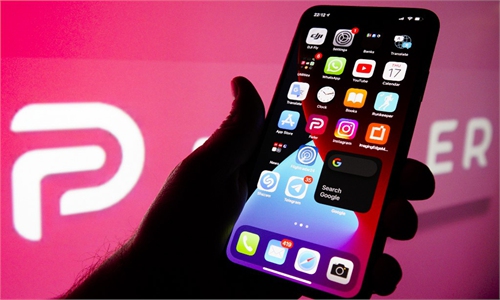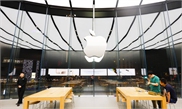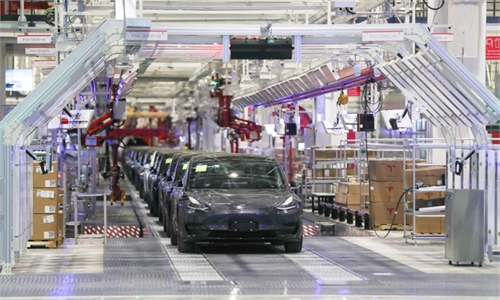
Flagship branch of Apple in Beijing Photo: Zhang Dan/GT
Apple seems to have entered a "golden" sales period when it comes to consumer preference in China.The US tech giant reported on Wednesday its highest-ever sales revenue for the fourth quarter of 2020, which beat Wall Street expectations to reach $111.44 billion. It marks the first time for the company's quarterly revenues exceeding $100 billion.
At a time when the world economy has been struggling with the resurging COVID-19 infections, a significant rise in China market sales is one major reason behind the record gain by Apple in the last quarter. Specifically, Apple CEO Tim Cook told Reuters in an interview that customers upgrading their iPhone devices "set an all-time record in China."
If Apple's popularity in China over a decade ago was driven by the scarcity of high-end smartphone models in the local market, today, when domestic brands like Huawei and Xiaomi are making inroads into the high-end 5G smartphone market, the US tech giant's record sales may be more of a reflection of the growing consumption power of the Chinese people.
While there are many different estimates of the size of China's middle class, an undeniable fact is that the group is enlarging very fast. Such development may give rise to a new wave of consumption dividends for high-end consumer goods in soon-to-be largest market in the world.
In the case of Apple's iPhone 12, given the relatively small price gap between 5G smartphones rolled out by Chinese phone brands and Apple, China's middle class consumers are more inclined to buy products under a traditional high-end brand. While domestic phone makers may need to make more efforts to earn consumer recognition in the high-end market, the process, on the other hand, could mean that Apple may usher in a golden period of sales in China.
This golden period for sales is not just for Apple, but for some other prestigious overseas brands as well. Take Tesla for another example. Compared with other domestic electric carmakers, Tesla has enjoyed an apparent customer preference in the Chinese market. Close to 140,000 locally produced Tesla Model-3 were delivered in 2020, making it the top-selling electric car in China. The explosive Chinese demand for green commute, the brand's elevating reputation as well as the support of local supply lines have all contributed to Tesla's success.
Tesla's Shanghai factory represents not just lower production costs compared with imported cars, but also means easier component maintenance backed by local supply chains.
For many sophisticated Chinese consumers, they prefer to make choice following market recognition when there is no obvious price difference between domestic and foreign brands. And if foreign brands have localized manufacturing facility, that will undoubtedly be an added bonus.
In the near to medium term, it may take some years for domestic brands to play catch-up in China's high-end market. In the meantime foreign brands in China need to try their best to ensure their "golden" period can be stretched out as long as possible, which requires not only advanced technology and local supply chains, but also a strong guarantee of the stability of economic and trade ties between the US and China.



